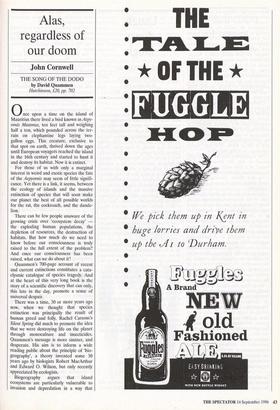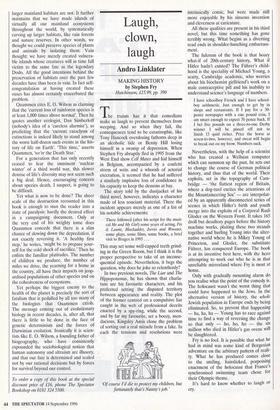Alas, regardless of our doom
John Cornwell
THE SONG OF THE DODO by David Quammen Hutchinson, £20, pp. 702
Once upon a time on the island of Mauritius there lived a bird known as Aepy- ornis Maximus, ten feet tall and weighing half a ton, which pounded across the ter- rain on elephantine legs laying two- gallon eggs. This creature, exclusive to that spot on earth, thrived down the ages until European voyagers reached the island in the 16th century and started to hunt it and destroy its habitat. Now it is extinct. For those of us with only a marginal interest in weird and exotic species the fate of the Aepyornis may seem of little signifi- cance. Yet there is a link, it seems, between the ecology of islands and the massive extinction of species that will soon make our planet the best of all possible worlds for the rat, the cockroach, and the dande- lion.
There can be few people unaware of the growing crisis over 'ecosystem decay' the exploding human populations, the depletion of resources, the destruction of habitats. But how much do we need to know before our consciousness is truly raised to the full extent of the problem? And once our consciousness has been raised, what can we do about it?
Quammen's 700-page account of recent and current extinctions constitutes a cata- clysmic catalogue of species tragedy. And at the heart of this very long book is the story of a scientific discovery that can only, this late in the day, promote a sense of universal despair.
There was a time, 30 or more years ago now, when we thought that species extinction was principally the result of human greed and folly. Rachel Carsons's Silent Spring did much to promote the idea that we were destroying life on the planet through monoculture and insecticides. Quammen's message is more sinister, and desperate. His aim is to inform a wide reading public about the principle of 'bio- geography', a theory invented some 30 years ago by biologists Robert MacArthur and Edward 0. Wilson, but only recently appreciated by ecologists.
Biogeography argues that island ecosystems are particularly vulnerable to invasion and depredation in a way that larger mainland habitats are not. It further maintains that we have made islands of virtually all our mainland ecosystems throughout the world, by systematically carving up larger habitats, like rain forests and nature reserves. In other words, we thought we could preserve species of plants and animals by isolating them. Vain thought: we have merely created vulnera- ble islands whose creatures will in time fall victim to the same fate as the legendary Dodo. All the good intentions behind the preservation of habitats over the past few decades have thus been in vain. In fact self- congratulation at having created these oases has almost certainly exacerbated the problem.
Quammen cites E. 0. Wilson as claiming that the 'current loss of rainforest species is at least 1,000 times above normal'. Then he quotes another ecologist, Dan Simberloff (nobody's idea of a 'careless alarmist'), as predicting that the 'current cataclysm of extinctions is indeed likely to stand among the worst half-dozen such events in the his- tory of life on Earth'. 'This time,' asserts Quammen, 'we're the Death Star.'
For a generation that has only recently ceased to fear the imminent 'nuclear winter' of a third world war, this slower demise of life's diversity may not seem such a big deal. Hence, encouraging concern about species death, I suspect, is going to be difficult.
Yet what is now to be done? The sheer scale of the destruction recounted in this book is enough to stun the reader into a state of paralysis: hardly the desired effect in a campaigning document. Only at the very end of his weighty tome does Quammen concede that there is a slim chance of slowing down the depredation, if not exactly reversing it. 'A healthy first step,' he writes, 'might be to prepare your- self for the cold shock of sacrifice.' Then he enlists the familiar platitudes. The number of children we produce, the number of miles we drive, the yearning for a home in the country, all have their impacts on jeop- ardised populations of other species and on the cohesiveness of ecosystems.
Yet perhaps the biggest enemy to the health of the planet is precisely the sort of fatalism that is pedalled by all too many of the biologists that Quammen extols. The message coming out of evolutionary biology in recent decades, is, after all, that there is little to be done in the face of genetic determinism and the forces of Darwinian evolution. Ironically it is scien- tists like E. 0. Wilson, a founding father of biogeography, who have consistently expounded the sociobiological notion that human autonomy and altruism are illusory, and that our fate is determined and sealed not by our rational decisions but by forces for survival beyond our control.
To order a copy of this book at the special discount price of £16, phone The Spectator Bookshop on 0181 324 5500.



































































 Previous page
Previous page